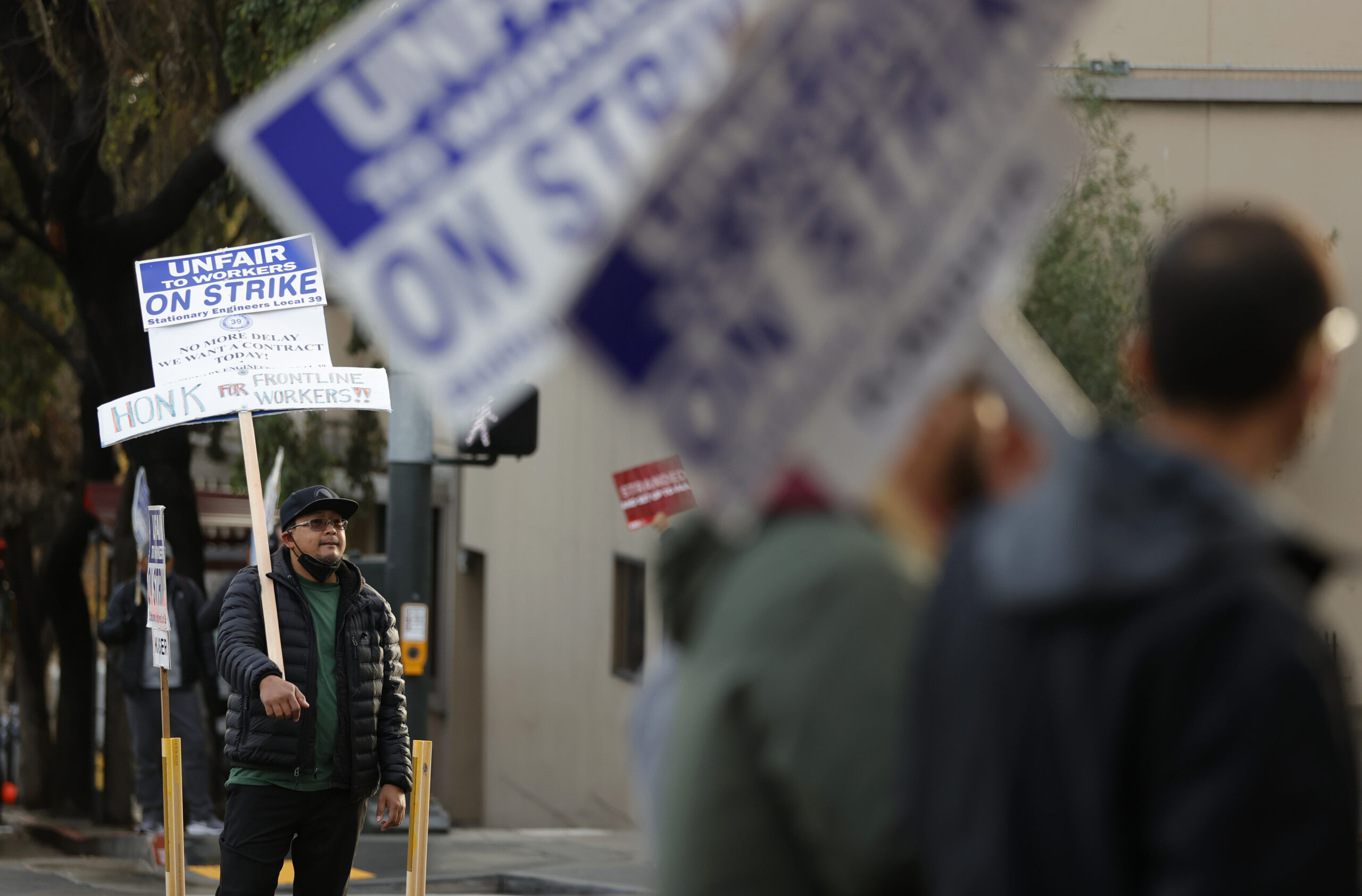Grocery workers at Lucky, the big supermarket chain with two locations in San Francisco and another in Daly City, were less than 12 hours away from voting to authorize a strike late last month when management called at 3:30 a.m. offering a “significantly” better deal, a union leader said.
“We got significant wage increases, a ratification bonus, healthcare improvements, more guaranteed hours, more full-time shifts,” said Jim Araby, director of strategic campaigns for the United Food and Commercial Workers Local 5, which organizes grocery store workers at Lucky as well as other major chains including Safeway. He would not disclose exact terms ahead of a union vote.
The last-minute Lucky deal shows how local labor unions, emboldened by a tight labor market and agitated by flush corporate profits at a time of growing public support for their cause, are well-positioned to win gains in both the public and private sectors.
“Right now, workers have greater bargaining power than they have had in a very long time,” said Ken Jacobs, the chair of the University of California Berkeley’s Center for Labor Research and Education.
Nationally, labor’s cause was further buoyed on Friday with a surprise win in a unionization vote at an Amazon warehouse in New York City. And workers at a Starbucks store in Santa Cruz County are one of nine cohorts at the coffee mega-chain to vote to unionize.
In San Francisco, this pro-labor turn is happening at a key moment. As the city emerges from the Covid-19 pandemic and local leaders look to boost vital economic engines like the city’s tourism sector, contracts for private-sector workers at San Francisco hotels and Safeway supermarkets are up for negotiation.
Labor’s renewed strength also means that disruptive work stoppages could be part of the landscape in the Bay Area in the coming months.
“And these aren’t defensive strikes,” called to protest cuts in pay or benefits, Araby said. “This is not fighting against takeaways. This is fighting for more. That’s the real difference. This hasn’t happened in a long time.”
In the first work stoppage at Chevron’s oil refinery in Richmond in 40 years, 500 members of the United Steel Workers are now on strike after the company rejected demands for a 5% pay increase to account for soaring cost of living in the Bay Area.
Contracts for longshoremen and stevedores at the Port of Oakland are all either already expired or expiring this summer at a moment when shipping supply chains are already disrupted.
And workers at cannabis-delivery service Eaze, one of several organized shops in the marijuana industry, are in negotiations.
Nearly all city worker unions are in negotiations, too. Of the 32 contracts between labor unions representing public employees at the city, only city police and firefighters have contracts that extend beyond June 30, the end of the fiscal year.
Everybody else—Muni drivers, teachers, sheriff’s deputies, building inspectors, nurses—are expected to drive hard bargains against city officials, who argue that the current city budget surplus is a temporary mirage created by state and federal stimulus largesse.
The city’s 1976 charter prohibits city workers from going on strike, with binding arbitration as the last resort.
Representatives from the Service Employees International Union 1021, which demonstrated outside of City Hall to protest what they identified as short-staffing at San Francisco General Hospital, declined to comment Friday, citing the sensitivity of negotiations.
But after two years of many “essential workers” suffering personal risk while the city enjoyed a flood of financial support, the unions are expected to demand significant wage and benefit increases.
In the crucial travel and tourism industry, a job action by pilots at Alaska Airlines disrupted travel at SF International Airport just last week.
More importantly perhaps, the situation in the city’s vital tourism industry, exemplified by the Hilton Union Square Hotel, which at more than 1,900 rooms is the largest on the West Coast, portends trouble on the horizon in that sector.
Occupancy at the Hilton crept close to 80% last fall—but hotel staffing stayed at early reopening lows of 40%, according to UNITE Local 2, the hotel workers’ union. Along with reduced staffing and increased workloads for those who are scheduled, the hotel is now encouraging guests to forego daily cleaning—a move that creates even more work for fewer housekeepers, according to the union, as less frequent cleaning creates a bigger mess.
Most housekeepers, who earn an average of $27 an hour with platinum healthcare benefits, are first-generation immigrants “locked out of other work,” said Ted Waetcher, a union spokesperson.
During the pandemic, “people experienced firsthand what it meant to feel disposable,” he added, noting that “every” major hotel in the city has a labor contract that expires this summer. “The militancy and readiness to fight is stronger than it’s ever been in our union.”
That could mean a near future in which European tourists, convinced by Mayor London Breed’s recent promotional junket to London and Paris to visit San Francisco, arrive at their accommodation to be greeted by an angry picket line.
Business leaders at the Bay Area Council, a lobbying group representing some of the region’s biggest companies, did not comment. The San Francisco Chamber of Commerce did not respond to requests for comment. David Perry, who handles press for the Hotel Council of San Francisco and PR staff at the Hilton’s Virginia-based corporate headquarters, did not immediately respond to requests for comment.
“The current level of worker activism seems unique in terms of its scope and reach into non-traditional areas,” said John W. Budd, a professor of Work and Organizations at the University of Minnesota’s Carlson School of Management, pointing to the Starbucks barista actions, among others.
He noted that private-sector union membership remains very small. “But what will this grow into?” he said.
